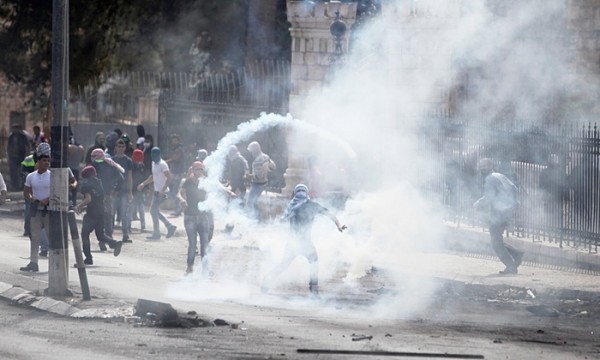
The latest round of attacks is shocking, but no anomaly. There will never be quiet as long as one group of citizens are forced to live without rights, and with no way out
In the past week there has been an onslaught of Palestinian stabbing attacksacross Israel and the West Bank, several each day – so many it is hard to keep track. In the span of just a few days, at least 20 Israelis have been wounded in over a dozen incidents, in addition to four Israelis killed at the start of the month. The violence is targeting both civilians and soldiers on both sides of the “green line”, the old pre-1967 boundary, with no distinction between far-off settlements or cities in the heart of Israel. There have also been increasing incidents of Israeli Jews attacking Palestinian citizens of Israel. The geography of the violence is beginning to take on the character of a civil war between Israelis and Palestinians.
This current round of violence may seem shocking but it is no anomaly: it is a direct result of government policy determined to normalise Israel’s occupation, now nearly 50 years old. Binyamin Netanyahu, Israel’s longest serving prime minister since David Ben-Gurion, was re-elected last March on a ticket that promised to preserve the status quo: tightening Israel’s hold on the West Bank while dismissing any possibility of a Palestinian state.
He has continued to entrench a reality in which Palestinians and Israelis who live side by side are subject to different laws and courts, use separate roads and have unequal access to basic necessities such as water and housing; where settler violence goes unchecked and discrimination is increasingly institutionalised; and where not only is there no recognition of the Palestinian right to statehood, but next to no recognition of Palestinian rights, period. Palestinians are under constant daily threat of losing their lives, homes, income, lands and dignity. Yet this reality is barely mentioned in the current Israeli rhetoric about “unrest” and a “wave of terror”.
Since this latest wave of violence began, Netanyahu has been lambasted by everyone – from the opposition to those in his own Likud party – for being soft on security. They are calling for tougher action, more closures, more military force on the ground, more freedom to act. In other words, more of the same. Responding to his critics, Netanyahu guaranteed that “there are no restrictions on the actions of our security forces”.
Indeed, in the last 11 days, Israel has killed 21 Palestinians, several of them minors, and wounded hundreds, a significant number with rubber or live bullets. These numbers include stabbers who were shot on the spot in self-defence, but also those shot at during protests – an all too common phenomenon – as well as an alleged stabber shot at point-blank range by police at a moment when it appears he didn’t pose a direct threat to anyone. Netanyahu has also vowed to increase and expedite home demolitions – a method that Israel’s own military has concluded is an ineffective deterrent. He has promised, too, to make broader use of detention without trial for suspects, even though Palestinian hunger strikes have proven to be one of the most effective non-violent tools for challenging this inhumane and illegal policy.
What we are witnessing is the result of the Israeli right’s failed vision of Greater Israel: Palestinians and Israelis living together in a de facto single state, one that is ruled by Jews and that privileges Jews. Resistance and violence are inevitable as long as Palestinians are forced to live under what is foreign rule, without basic rights and representation, and with no way out. No amount of one-tonne bombs or collective punishment will ever provide Israelis with the long-term safety they crave.
This is most evident in Jerusalem, the microcosm of Israel’s one-state reality, where Palestinians and Israelis live on top of each other on grossly unequal terms and where the Palestinian Authority is prohibited from operating. Since the city became a flashpoint of daily violence last summer following the murder of the Palestinian teenager Mohammed Abu Khdeir – himself murdered in revenge for the murder of three Israeli teens – Israeli forces have been shooting more, injuring more and cracking down more, with no calm in sight. It is here that the right’s failed ideology is plain for everyone to see.
Israelis have lived in perpetual conflict since the state was established, with fleeting periods of calm, some longer than others. The relative quiet experienced by Israelis in the last decade since the second intifada convinced many that the status quo could continue without consequences. But the notion that there will ever be quiet and stability in the context of Israel’s ongoing domination of the Palestinians with no diplomatic horizon is a delusion. The critical question, then, is how much more violence will it take for Israelis to realise the path they are going on promises them a bleak future?
The Guardian

Leave a Reply
You must be logged in to post a comment.